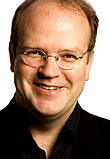
Bernard Labadie, conductor
..
.
 |
|
Bernard Labadie, conductor |
|
b i o g r a p h y...........back to roster....up June 2012 Bernard Labadie has established himself worldwide as one of the leading conductors of the Baroque and Classical repertoire, a reputation that is closely tied with Les Violons du Roy and La Chapelle de Québec which he founded and continues to lead as music director to this day. With these two ensembles he regularly tours Canada, the US and Europe, in major venues and festivals such as Carnegie Hall (most recently in March 2012) and Lincoln Center, Walt Disney Concert Hall, Kennedy Center, Barbican, Concertgebouw, and the Salzburg Festival, among others. Passionate about opera, Labadie has also been artistic director of L’Opéra de Québec and L’Opéra de Montréal. As a guest he conducted Handel’s Orlando with Glimmerglass Opera, Mozart’s Così fan tutte at the Mostly Mozart Festival, and Mozart’s Lucio Silla with Santa Fe Opera, to highlight a few. September 2009 marked his debut with the Metropolitan Opera in Mozart’s Die Zauberflöte, a work he conducted again at Cincinnati Opera in 2011.Ever since his triumphant debut with the Minnesota Orchestra in 1999, Labadie has become a regular presence on the podiums of the major North American orchestras, including the New York and Los Angeles Philharmonics, the Philadelphia Orchestra, the symphony orchestras of Chicago, Boston, San Francisco, St. Louis, Houston, Atlanta, Detroit, Montreal, Toronto and Vancouver, most of them on a regular basis. His debut with the Cleveland Orchestra occurred in early 2010. Testament to Labadie’s appeal with audiences around the world is the long list of re-engagements during the 2012/13 season. In the US, his itinerary takes him to the New York Philharmonic, San Francisco Symphony, St. Louis Symphony, Toronto Symphony and Handel & Haydn Society. Overseas he goes on his third Australian journey to conduct the Melbourne Symphony and leads various European orchestras like the Academy of Ancient Music, WDR Sinfonieorchester in Cologne, Hamburger Symphoniker, Northern Sinfonia, BBC Scottish Symphony, Swedish Chamber Orchestra and the Brussels Philharmonic. His 2011/12 calendar was filled with such engagements as his debut at Tanglewood and returns to the Chicago Symphony, Los Angeles Philharmonic, New World Symphony, Utah Symphony, Vancouver Symphony among other orchestras. Season 2010/11 brought another wide array of return engagements, including the New York Philharmonic and the symphonies of Toronto, San Francisco, St. Louis, Colorado, as well as Boston’s Handel & Haydn Society. In Europe he made debuts with the Orchestra of the Age of Enlightenment, the Academy of Ancient Music, and the Zurich Chamber Orchestra.Other recent highlights point to appearances with the Royal Concertgebouw Orchestra, the Orchestra of the Collegium Vocale Ghent, the Royal Scottish National Orchestra in Glasgow, the NDR Orchestra in Hannover, and the Melbourne ABC Orchestra. Labadie’s extensive discography includes many critically acclaimed recordings on the Dorian, ATMA and Virgin Classics labels, including Handel’s Apollo e Dafne and his collaboration with Les Violons du Roy and La Chapelle de Québec of Mozart’s Requiem, both winning Canada’s Juno Award. A complete recording of C.P.E. Bach’s Cello Concertos with Truls Mørk and Les Violons du Roy was released in 2011, as was a recording of J.S. Bach Piano Concertos with Alexandre Tharaud, both for Virgin Classics. For his achievements, the Canadian government honored him with the appointment as "Officer of the Order of Canada" in 2005 and Quebec made him a "Chevalier de l’Ordre National du Québec" in 2006.
|
. r e v i e w s...........back to roster....up Toronto Symphony Orchestra of the Age of Enlightenment (debut) Cleveland Orchestra (debut)
|
| N E W S |